Category Archives: Info Article
How Much Does It Cost To Buy A Ranch?
Now more than ever, Americans are flocking to buy their very own piece of land. The idea of owning a ranch is increasing in popularity, and so is the demand. But buying land isn’t as simple or as easy as buying a typical single-family home. There are many things to keep in mind, and one of the most crucial factors of buying a ranch is the cost. Here are some of the extra costs to keep in mind when buying a ranch.

Property Value
The most important thing you want to establish is the baseline cost of the property itself. How much can you expect to pay for your own piece of land? This cost will obviously vary depending on your purchase location (think Texas vs. California), property features, land improvements, zoning rights, the intended use of the land, and property acreage. All of these factors can affect land valuation. Other aspects of the property’s location, such as road access, proximity to town, elevation, weather, and the growing season will also contribute to its value as well. You can expect to pay more for a property that has already been built upon, has access to natural resources such as streams for fishing, and is in a high-demand area.
Because ranches can vary greatly in size and cost, the best option is to talk to a qualified real estate broker who specializes in ranches to narrow the field. Smaller ranches can often be purchased for under $1million while large ranches with desirable features can pull in tens of millions of dollars.
Site Development and Site Improvement
In addition to the potential costs of adding your own site improvements, such as a home and outbuildings, you will typically need to budget for plans, permits, and other legal costs or local fees. These fees can run anywhere from $10,000 to $20,000 in some areas such as Colorado or California. Some communities add impact fees as high as $100,000 in order to discourage development. In addition to the costs of building the structures themselves, keep in mind the potential costs for land surveys, soil testing, utility hookups, septic system costs, excavation, land clearing, well drilling (if needed), landscaping or paving, and more. You will need to work with your realtor and other professionals to have a good idea of the costs involved before making your land or ranch purchase.
Appraisal
Rural appraisals are typically acquired by the buyer of a property in order to determine the true land value and negotiate a deal. Due to federal law, all lenders will require an appraisal before closing a real estate deal. Rural appraisers may run a cost analysis of the land value along with the buildings and any needed improvements, perform a sales comparison with comparable properties in the area, or configure a property value using the projected net income of the site. It is highly recommended that you hire a rural appraisal specialist who is familiar with the area and property type you are looking to buy. According to HomeAdvisor, the average cost of a land appraisal is $1,000 to $3,000, but you can expect to pay as much as $8,000 for an expert opinion in some areas.
Closing Costs
Closing costs are the typical expenses incurred by both buyers and sellers during the sale and purchase of a property. The closing costs can be a large chunk of change, and ranch or land purchases are no exception. When using a lender, there will be many fees and charges, including origination fees, credit report fees, attorney fees, document fees, land surveys, title search costs, title insurance, inspections, and escrow account funds. In addition, there are some statutory costs involved, even if you are paying for your property entirely in cash. These include transfer taxes, deed recording fees, pro-rated local taxes, and other state or local fees. Generally speaking, you can expect to pay anywhere between 3 and 5 percent of the total purchase price in closing costs.
Final Thoughts
Choosing to invest in a ranch property is a wise decision that can bring many rewards to you and your family for generations to come. With the right research and considerations, you can make an informed purchase decision that will add to your legacy and result in enjoyment for many years. At Mirr Ranch Group, we are experts at buying and selling all types of ranches across many U.S. states. If you need assistance with purchasing your new dream ranch, don’t hesitate to give us a call today!
A Quick Introduction to Utah Farms & Ranch Land
Utah is home to some spectacular landscape and is well-known for its outstanding living standards. Many people might head this way to enjoy world-class ski resorts and recreational activities. But some investors are keen to enjoy an authentic Western experience and work the land.

The Beehive State is home to over 18,000 farms, with agricultural land accounting for over 11 million acres. This presents many exciting possibilities for new and experienced ranchers alike. This post will take a closer look at Utah farms and ranch land and how they play a pivotal role in Utah’s economy.
Facts about Agriculture in Utah
Livestock and livestock products account for the largest share of the state’s agricultural receipts. There is a massive demand for high-quality beef and milk products, with cattle sales reaching around $380 million last year.
The range of crops, fruits, and vegetables that grow in the state is as diverse as the landscape. In terms of yields, hay is the largest crop and is used predominately to support the beef and dairy cattle producers. Wheat, barley, onions, potatoes, apples, and peaches are all products that generate sizeable income streams. Utah is also the second-largest tart cherry producing state in the country.
As you can see, Utah might not generate the massive receipts of states like California, Texas, and Nebraska, but it is certainly a viable and sustainable option for ranchers.
Opportunities for Ranchers
If you are new to ranching, one of the best options is leasing parts of your land. Some ranches that are on the market may come with existing arrangements, and they are excellent sources of regular income. Depending on the type of lease, you may have no work to do at all. Some ranchers lease land for grazing and while others will have more extensive leases in place where the cattle herder is responsible for looking after that plot of land, maintaining the fences, and removing weeds, etc. It is a great way to support the local industry while creating a nice income stream.
Larger ranches may be ideal candidates for running large-scale cattle businesses. If you are new to the game, it would be worth consulting or hiring a ranch management company to help create a land management strategy, irrigation, and rotations.
Utah has a thriving nursery and potted plant industry, so running a hobby farm might be an option for some owners. Growing fruit and vegetables is a rewarding activity for people of all ages, with some ranchers opting to sell some of their produce at the local farmer’s markets that are popular throughout the state. You can enjoy a relaxing hobby that allows you to get into nature while also creating a viable business.
It is worth noting that ranches and farms classed as agricultural properties may benefit from lower property taxes. In Utah, agricultural properties are taxed on their production capabilities rather than their market value.
Types of Colorado Ranches for Sale
If you’re in the market for a nice piece of ranch land to call your own, Colorado is probably on your shortlist of states to consider buying in. As one of the most picturesque areas of the country, Colorado has much to offer prospective buyers.
No matter what type of land you buy, you can rest assured that your purchase decision is a great investment. Here’s a quick rundown of some of the available types of ranch properties you can find in the great Rocky Mountain state.
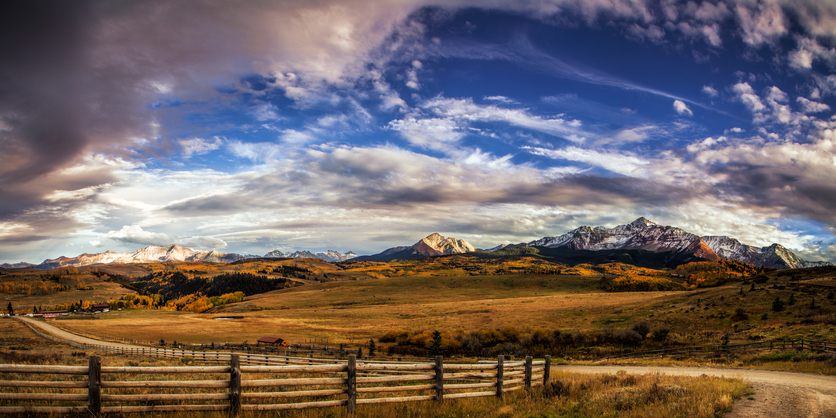
Cattle Ranches
As one of the top cattle-producing states in the U.S. (number 10 to be exact), Colorado is home to many large cattle ranches and more than 3 million head of cattle. In fact, the raising of beef cattle is the state’s number 1 agricultural endeavor. Most of Colorado’s cattle ranches can be found in the eastern plains region with some grazing lands also available in the Rocky Mountains and in the basin area of western Colorado.
Big Game Hunting Ranches
Many Colorado ranches offer access to unparalleled natural wildlife habitats for big game such as elk, deer, pronghorn and even bears. An abundance of untouched, untamed land across much of the state makes finding a big game hunting ranch an easy task in the Rocky Mountain state. Some of these properties even include access to fly fishing streams.
Fly Fishing Ranches
One of Colorado’s greatest claims to fame is its status as a well-known destination for fly fishing. The abundance of natural mountain streams, crystal blue lakes, and rushing rivers creates many popular locales for catching trout underneath an open sky and stunning mountain backdrop. Colorado is home to more than 9,000 miles of trout streams, which are home to large quantities of rainbow, brown and cutthroat trout. Many fishing properties are located along popular waters such as the Roaring Fork River, Frying Pan River, or Crystal River, and many ranches even include access to big game hunting opportunities.
Horse & Equestrian Properties
The picturesque Colorado mountains make a great backdrop for any horse farm. As a western state, cowboy culture never completely left these parts. Whether you’re hoping to breed horses, facilitate lessons, or simply enjoy a beautiful equestrian property, the great state of Colorado is a wonderful choice. Many turnkey equestrian properties are available.
Agricultural Farmland
Natural water sources, acres upon acres of open land, and a semi-arid climate make the eastern plains region of Colorado the ideal growing environment for many crops such as corn, wheat, hay, and oats. Cattle ranching, dairy farming, and hog farming are also popular in this region. In the west, cool nights, and warm days allow farmers to grow many delicious crops such as peaches, sweet corn, apples, and berries. A large wine production industry thrives in this region as well. In the mountains, ranchers can expect ideal grazing conditions for cattle, abundant hay production, and the ability to easily grow cold-weather crops such as lettuce and spinach.
Final Thoughts
At Mirr Ranch Group, our experts know the land well. Whether you’re looking for big game hunting, a fly fishing haven, or a traditional cattle ranch, we’d love to help you find your next home or property in the great state of Colorado. Give us a call today!
Things to Consider Before You Buy Wyoming Ranches
The purchase of ranch property in Wyoming is unlike the purchase of any other type of real estate. There are many considerations to keep in mind before embarking on the land purchase of a ranch.
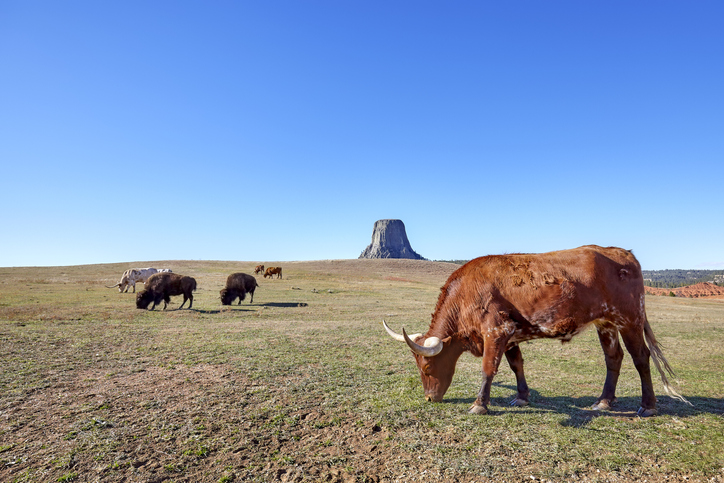
Location
The location of your future ranch property is probably the first and most important thing you will need to consider. There are many additional factors to buying ranch land that do not necessarily come into play when buying a single-family home or residence. For example, you will need to think more about the natural attributes of the land, such as water sources, climate, growing season, and elevation. Depending on your intended use of the land, these factors can make or break your success in your endeavors.
Purpose
As mentioned above, which ranch property you ultimately buy will be determined by the purpose you have in mind for the land. For example, if you intend to raise cattle, you will need to look for natural water sources, an abundance of natural grazing grasses, and a lack of harsh weather. If you are on the hunt for the perfect fly fishing property, you will want to look for a property that has its own trout stream running through it. As you can see, the desired usage will contribute to your exact property decision.
Property Rights, Easements & Zoning
These are some of the most important issues to consider when buying a ranch property that to do not typically come up in other types of home purchases. Understanding any restrictions or regulations on the property, such as water rights, mineral rights, and access rights, are critical to ensuring a successful purchase. Access rights determine how you will get to your property and can include road frontage access or deeded easements. Mineral rights regulate access to natural resources underneath the surface, such as coal, oil, and natural gas. Water rights apply to natural water sources on the property, allowing you the legal use of the water without owning it. These factors will vary widely from property to property, and you will want to be sure you are educated on each one before buying your ranch land.
Accessibility
Another important part of property accessibility briefly mentioned above is what kind of reachability are you looking for? Some ranch buyers prefer to be extremely isolated and don’t mind if their property is only reachable seasonally or with an off-road vehicle. Other purchasers prefer to be close to town with reliable roads. Factors such as your health, ability to rely on natural resources, and how often you will be going to your property will all weigh in on helping you make this decision.
Livability
No one wants a dead piece of land. It is important to ensure that the acreage you intend to buy is ideal for producing crops, nurturing livestock, supporting wild fish and game, or otherwise suited to your own personal survival and comfort. Environmental factors such as flooding, harsh winters, and droughts all need to be taken into consideration when buying ranch land. For those who intend to build a home on the property, you’ll want to make sure the land can support either off-grid living or access to city utilities. Will you need a storm shelter? Will you need to build on higher ground? If you are not sure about a potential property’s climate and resources, ask around with locals or check with a qualified real estate agent.
Final Thoughts
At Mirr Ranch Group, we have the knowledge and expertise necessary to help you buy your Wyoming ranch. Give us a call today to learn more about real estate purchases in The Cowboy State.
4 Things to Consider Before You Buy Utah Ranches
For many ranchers, there is no greater feeling than owning your very own piece of the great American outdoors! However, locating and buying a ranch property is not quite the same experience as buying a regular single-family home. There are many critical things to keep in mind before purchasing a Utah ranch property. Here are some of the things to consider before you buy Utah ranches.
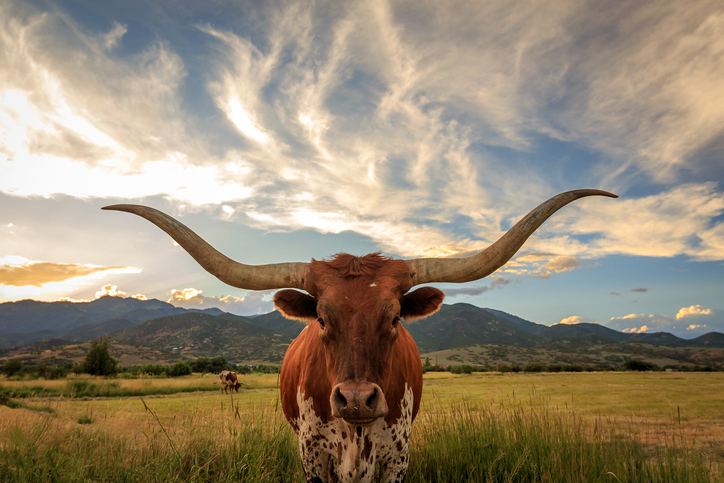
Future Usage
It is ideal to purchase a property that has already been set up or used for the same purpose you intend to utilize the ranch for. For example, if you are looking for a cattle ranch, a property with existing grazing land and irrigated pastures as well as fencing, corrals, sheds, and other supportive structures is going to be a more effective purchase than buying a former hunting ground. And if you are looking for a fly fishing property, it won’t do you any good to purchase a working dairy farm. A qualified real estate agent who specializes in ranches can help you identify and locate the type of ranch you want.
Location
Many Utah ranches are located in the northwestern or southeastern regions of the state. Your ideal location will also depend on the property type. Fly fishing ranches tend to be located along the Provo, Logan, or Green rivers. Cattle ranching is most common among the state’s lower-lying ground in Utah’s many lower canyons, valleys, and basins. In addition to topography, you will also need to consider climate and growing season if you will be growing crops or raising livestock. It is important to work with someone who can help you locate the very best property for you.
Amenities
Another factor to consider is how close to any city resources you would like to be. Utah ranches can be very rural and isolated, or they can be located along major roads closer to city utilities, shopping, health care facilities, and other resources. Your answer to this question may also depend on whether you intend to live on this property year-round, use it as a vacation home only, make it into a working ranch, or rent it out to visitors. A hunting property you only need to reach a few times per year will not need as much access to local roads and amenities as a primary residence or working farm would.
Rights, Deeds & Restrictions
Some legal considerations to keep in mind are mineral rights, access rights, and water rights. Water rights allow you to legally use water for agricultural and other purposes, even if you don’t own it. Mineral rights regulate the use of natural resources that are just below the surface, such as oil, gas, and coal. Access rights have to do with your ability to access your property either from roads or neighboring properties. Some of these legal considerations may not apply to you depending on what you will be using the property for, so it is important to speak with a qualified professional before making your purchase.
Final Thoughts
Investing in ranch land in the great state of Utah is a fantastic investment choice. However, understanding all of the nuances that go into making such a large purchase is critical to ensuring your success. Buying ranch land is a big decision that can come with huge benefits. Talking to a qualified expert can help you make an educated and informed purchase decision. At Mirr Ranch Group, we have the knowledge and expertise you need to succeed, and we are happy to speak with you about your dream ranch property. Give us a call today!
Things To Consider Before Buying A Ranch
There’s no greater feeling than owning your very own piece of the great outdoors! But buying a ranch is not quite as simple as buying a single-family home. There are many important things to consider before buying ranches for yourself and your family. Here are some of the things you should keep in mind as you embark on your property search.
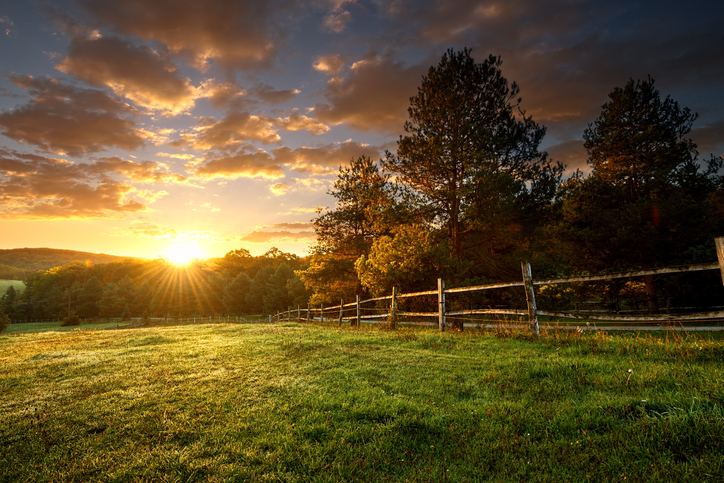
Location
As the old saying goes – “Location, location, location!” Never will this be more important than when you are considering the purchase of a piece of land. Factors such as elevation, weather, growing season, water sources, and more will all contribute to your purchase decision.
Usage
An important consideration when looking for ranch land is its desired purpose. In short, what will you be using the property for? A property that you purchase purely for recreational enjoyment is different than the one you intend to use as a source of income.
Accessibility
How isolated do you want to be? Do you prefer to be the only one around for miles, or is quick access to a town and other resources important to you? Can the property be accessed year-round, or is it unreachable during certain times of the year, such as during the rainy season? Will you need an off-road vehicle to reach it, or are there clearly developed roads already in place?
Livability
A large plot of acreage won’t do you any good if, for whatever reason, the land is not livable. Frequent flooding, droughts, and other factors could render an otherwise gorgeous piece of property unusable.
If you plan to use the property for ranching, can crops and livestock survive there? If you’re searching for hunting grounds, is there an abundance of natural wildlife? If the ranch is to be your home, is there flat ground to build on and enough resources to make it a viable option? These are all crucial questions to consider before making such a significant investment.
Zoning & Rights
Water rights, mineral rights, and access rights are some of the most important regulations to consider when purchasing your dream ranch property. Water rights allow the legal use of water for various uses. Throughout much of the West, you may not have rights to the water running through your property, so this is important to understand. Mineral rights apply to natural resources that are underneath the surface level, such as coal, natural gas, and oil.
Most importantly, access rights ensure that you will have a way to reliably get to your property either by road frontage or deeded easements. These laws can be complicated and may vary from state to state and property to property. Future ranchers should research thoroughly and educate themselves before buying.
Final Thoughts
Choosing to invest in a ranch is a big decision that comes with big rewards. With the proper research and considerations, you can make an informed purchase that will result in enjoyment and even income for many years to come. At Mirr Ranch Group, we serve buyers and sellers of all types of ranches. If you need assistance with purchasing your new dream ranch, don’t hesitate to give us a call today!
Exploring the Pros and Cons of Different Sizes of Montana Ranches
The Big Sky Country has long been attracting people looking for ranch properties. Since Montana is so sparsely populated, it is a perfect space to escape and enjoy the great outdoors. It is also a great place to run many different business operations, whether agricultural or recreational.
While the reasons for buying a ranch differ from person to person, one of the key considerations is always the size of the ranch. Smaller lifestyle ranches may attract new ranchers, but more experienced hands may opt for something with more acreage. In this post, we will take a closer look at the pros and cons of different sizes of Montana ranches.

Nature as Far as the Eye Can See
One of the significant benefits of owning a large ranch property in Montana is that you will have the area to yourself and can literally go as long as you want without seeing another human being. With a natural playground to enjoy, you can go hunting, fly-fishing, hiking, or camping under the stars. While living in the middle of the wilderness may be a very appealing thought, there are several factors to consider, such as access to the site, local infrastructure, existing ranch borders, and all the work that is required to maintain the land within the property.
Montana is home to a number of outstanding large ranch properties, which can be utilized for many different business opportunities. Ranches with abundant water sources and diverse soil are ideal for cattle, and larger acreages increase the amount of livestock that can be held on-site. Cattle receipts are a major driver of the state’s agricultural sector, and Montana is one of the leading producers of wheat in the United States.
Another benefit of owning a larger ranch is that you can participate in some of the state’s conservation policies. If you allow a conservation easement on your ranch, you can gain many tax benefits while protecting valuable resources for future generations.
Less Is Sometimes More
Smaller ranches are becoming more popular with new ranchers, as they offer privacy and all the benefits of ranch land in the West. Thanks to their size, they are much easier to maintain than the larger working ranches elsewhere in the state. These kinds of ranches were traditionally called “gentlemen’s ranches,” but these days, they appeal more to individuals and families looking to enjoy time away from the city.
Typically, smaller ranches cover less than 100 acres and will be located in some prime locations close to one of the state’s spectacular national parks or forests. Some investors buy parcels of land, on which they can build a dream home, while other ranches may have existing high-quality lodging already in place.
The closer the ranch is to national parks or ski resorts, the less acreage you will typically get for the money. However, due to the continued demand for properties in these areas, the investment potential is very attractive.
Two Key Considerations When Searching for Ranches for Sale in Wyoming
Land has always been a valuable commodity, and with high-quality, unspoiled land in high demand, there has never been a better time to invest. Throughout the American West, high-net-worth investors have been looking to buy ranch properties.
Some investors will be seeking mountain retreats close to national parks, forests, or ski resorts. These act as an excellent base for weekends and vacations. On the other hand, some investors are looking to swap their urban lifestyles for something completely different. With its longstanding cowboy heritage, Wyoming is a great place to achieve either of these aims. Ranches for sale in Wyoming vary significantly in size and the sort of lifestyle that is on offer.
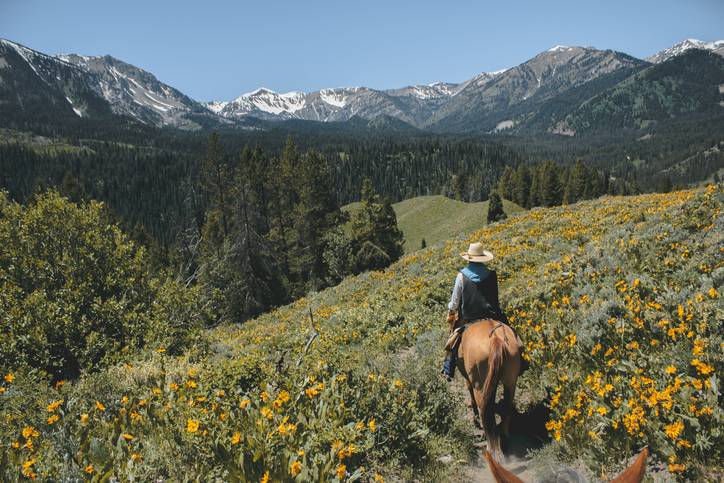
Horseback riding through the wildflowers in the Grand Teton Moutain range.
Vacation Home or Permanent Residence?
At the beginning of a search for property, investors should have a clear idea of whether they plan to work the land or fly in for the holidays. In both situations, access will be an essential consideration. You will want to be aware of the availability of flights to the area and how close the property is to the nearest airport.
Access to a site can be challenging at certain times of the year, and the isolation of mountain ranches might be a step too far for some new ranchers. On the other hand, ranches close to places such as Yellowstone National Park will offer excellent recreational opportunities and good road infrastructure, but the price will probably be higher.
For those investors looking for a more permanent residence, you will need to consider how you want to spend your time. Agriculture is big business within the state, with cattle being the number one source of receipts. Some new ranchers will opt to start a small operation raising cattle or supporting the existing industry by producing hay or feed. If this is something you are considering, you will need to learn about the soil and water rights to see if an agricultural operation is a viable option.
What Do You Want from the Ranch?
Location is a primary concern as it will also determine the sort of activities you can do there. Wyoming is one of the best states for big game hunting and fishing in the entire country, but if a ranch is in an area of large-scale agricultural production, the hunting opportunities may be limited.
One of the biggest draws to the state is its unrivaled natural beauty. Yellowstone National Park and Thunder Basin National Grasslands are just two areas ripe for exploration. Unsurprisingly, outdoor enthusiasts, hunters, and fly-fishers all head to the state to explore its natural bounty.
If you plan to spend time hunting or fishing on the property, you will want to buy a ranch which has ideal habitat for big game and that is well-watered. Ranches located on or near the North Platte River will benefit from excellent water resources which attract big game, but that is also home to some of the best rainbow trout fishing in the country.
Potential Benefits of Owning Ranch Properties in Idaho
Idaho makes an ideal location for investors who want to start an agricultural operation or spend their vacations in the great outdoors. The state is famous for its vast expanses of untouched land and the outstanding recreational activities on offer. It is also an ideal state to fully immerse yourself in the Cowboy lifestyle by running a cattle or agricultural business.
Ranch properties in Idaho vary significantly in terms of size and function. However, there are many features of the Gem State, which male ranch properties in Idaho an exciting investment opportunity.

A Wealth of Natural Beauty
Untouched Land: With over 30 national and state parks, the state is perfect for outdoor lovers. Fishing and hunting are big draws, as is rafting on some of the challenging stretches of river throughout the state. The volume of untouched land supports many different kinds of ecosystems, which landowners can support by participating in conservation initiatives. In more mountainous and secluded areas, ranch owners will share the land with many different species of wildlife and may even see big game roaming around.
Winter Sports: With its numerous mountain ranges, Idaho is a perfect place for winter sports. Sun Valley and Schweitzer ski resorts have a variety of runs and amenities that are suitable for all levels and tastes. It is possible to find ranch properties close to the slopes, which enables easy access throughout the year. Of course, the higher the elevation the ranch sits at, the higher the likelihood that you will get plenty of snow on your land. So, you may not even have to head to the ski resorts as you will be able to enjoy snowmobiling, cross-country skiing, sledding, and snowshoeing without having to leave your property.
Gold Medal Fishing: Anglers continuously rate Idaho as one of the best states for fly-fishing in the USA. Throughout the state, there are lakes, rivers, creeks, and reservoirs well stocked with rainbow trout, brown trout, salmon, and carp amongst many other different species. What attracts many people to the waters of Idaho is the combination of challenging, well-stocked waters framed by the stunning mountains. Places like Silver Creek and Snake River are just two examples of places to search for that next big catch.
The Importance of Mineral Rights
Idaho is nicknamed the Gem State due to its wealth of natural resources below the surface. Large deposits of silver, zinc, and lead continue to be found within state borders. Owning the mineral rights for your ranch is highly desirable, as it will enable you to either extract any minerals or sell certain rights to interested parties. As such, this can add significant value to the property. However, ranch owners that don’t hold the mineral rights may find the privacy they have seeking could be disrupted.
New ranchers may not be familiar with the complexities of mineral rights ownership, so they must get an expert land appraisal before going ahead with any potential purchase.
Factors That Can Affect the Valuation of Utah Ranches
Lifestyle ranches have been becoming increasingly popular with high-net-worth investors. The combination of privacy and outstanding hunting and fishing on unspoiled land is a big draw. As such, investors are happy to pay a premium for top-quality properties with easy access to local airports, towns, and areas of natural beauty.
Utah has a lot to offer new and experienced ranchers alike. However, the demand for Utah ranches close to Salt Lake City and nearby ski resorts means they don’t usually stay on the market for long.
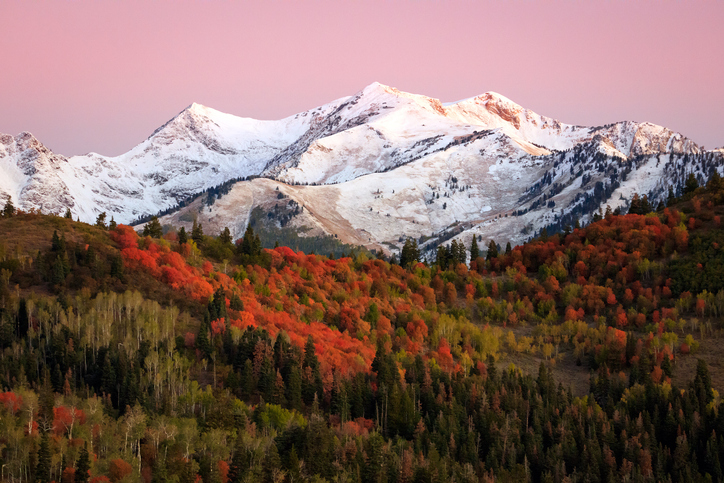
Factors That Affect Land Valuations
Lifestyle ranches offer a perfect introduction to the ‘cowboy’ lifestyle without the need to run large-scale agricultural operations. Typically, they will be smaller in size than working ranches, but they will still have access to lots of land to explore. Some recreational ranchers may run small cattle operations, but this is rarely the primary focus for these investors. Instead, they tend to look for ranches in good locations, with pristine hunting or fishing land to enjoy.
The valuation of the property will be determined by many different factors, such as the acreage and location of the land. Ranches that share borders with national parks or national forests will tend to come on the market at a premium. This is especially true if the property has private access to stretches of rivers or creeks, as well as private landowner tags for big game species.
Investors looking for vacation homes will also need to pay close attention to the quality of any existing buildings and state zoning laws. If the property already has luxurious buildings in place, then the price will reflect that. Zoning regulations will also impact what can and can’t be done on a property, so it pays to be clear about this when conducting an initial search.
Location, Location, Location
The location of a ranch property will have a massive impact on the selling price and also the kind of life that you can enjoy there. End-of-the-road locations offer privacy but might bring additional headaches in the winter due to access issues. Likewise, ranches close to Salt Lake City, Park City, or the Utah ski resorts offer excellent year-round access, but the available properties will probably be much smaller in terms of acreage.
Being within a short driving distance of an airport is another desirable feature for people looking to only use the property as a vacation home or weekend getaway. Again, ranches located close to cities and major ski resorts will have access to more flights, while the roads will be maintained throughout the winter season. The more remote a property is, the harder it can be to get too, and may even require usually specialist snow vehicles during times of heavy snow.
It is imperative that you have a very clear idea of the type of property and lifestyle you are looking for before you start searching. Ranches in the foothills of the Rocky Mountains are in high demand due to the outstanding natural beauty and opportunities for skiing, hunting, fishing, and other recreational activities during the year.















